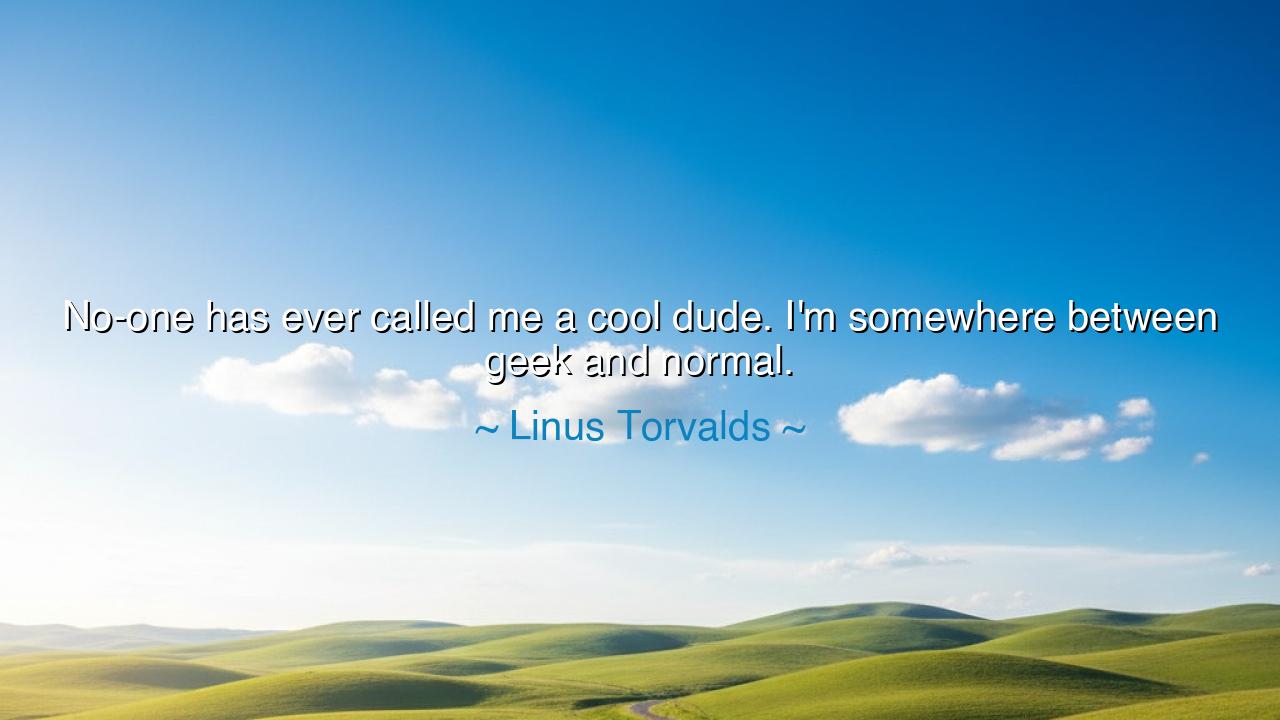
No-one has ever called me a cool dude. I'm somewhere between geek






"No-one has ever called me a cool dude. I'm somewhere between geek and normal." These words, spoken by Linus Torvalds, reflect a deep and honest acknowledgment of self-perception and the complexities of identity. Torvalds, a figure whose work has shaped the very foundations of modern technology, humbly places himself in a space between the labels of “geek” and “normal,” recognizing the duality of being both deeply immersed in a field often associated with intellectual pursuit and technicality, while simultaneously navigating the world of broader society. In this simple statement, he offers a glimpse into the human condition, where self-awareness and honesty often clash with societal expectations.
In the world of ancient wisdom, figures like Socrates embraced a similar notion of self-awareness. Socrates, perhaps one of the most revered thinkers in Western philosophy, was not concerned with being seen as a cool philosopher, nor did he seek to conform to the expectations of his time. Instead, he famously stated, "The only true wisdom is in knowing you know nothing." This humble recognition of one’s place in the grand tapestry of knowledge aligns closely with Torvalds’ reflection. In ancient cultures, the great minds often eschewed the allure of popularity or public adoration, instead choosing a path of self-exploration and personal growth. Torvalds' statement is akin to this ancient philosophy: it is a reminder that true value comes not from the opinions of others, but from the pursuit of purpose, regardless of external labels.
Torvalds, as the creator of Linux, has made an indelible mark on the world, yet his self-description as “somewhere between geek and normal” speaks to the quiet humility of someone who recognizes that their value is not defined by external accolades or popularity. In the same way, the Roman stoics, like Epictetus, taught that personal virtue and integrity were far more important than public recognition. Epictetus once said, "It is not what happens to you, but how you react to it that matters." Torvalds embodies this principle: by focusing on his work and passion rather than seeking praise, he aligns with the age-old wisdom that true contentment comes from being grounded in one’s purpose, not in fleeting social approval.
The tension between being unique and the desire to fit in is something that every individual faces. Torvalds' experience is not uncommon; in fact, many of the greatest minds throughout history have existed in the tension between eccentricity and normalcy. Take Albert Einstein, for example, who was often described as absent-minded, somewhat aloof, and deeply immersed in his thoughts. Despite being one of the most influential scientists of all time, he was rarely seen as “cool” in the conventional sense. In fact, his appearance—disheveled hair, quirky mannerisms, and disregard for social conventions—set him apart from his peers. Yet, his contributions have shaped the very fabric of modern physics. Einstein, like Torvalds, was undeterred by societal perceptions, instead choosing to walk his own path—one rooted in intellectual curiosity and individuality.
In this context, Torvalds’ humility in labeling himself as “somewhere between geek and normal” teaches us an important lesson: the desire to be “cool” is often a fleeting and empty pursuit. True fulfillment lies in embracing one’s authentic self, regardless of whether that self aligns with the expectations of society. The philosopher Aristotle spoke of the "golden mean," the idea that balance—between extremes—is the key to a virtuous life. Torvalds, in his own way, seems to embody this balance. He doesn’t seek the extreme coolness of celebrity, nor does he bury himself in the label of the geek. He occupies a space that allows him to be true to his passion and his work, unburdened by the pressure to fit into any particular mold.
The lesson here is profound. Self-acceptance is the foundation for true personal growth. Just as Socrates and Einstein were not swayed by the opinions of others, Torvalds teaches us that to create, to innovate, and to leave a mark on the world, we must be willing to stand outside the narrow confines of popular opinion. By embracing humility and recognizing that we do not need to be “cool” in the conventional sense, we can find peace in our identity and build meaningful work that is rooted in purpose, not perception.
Thus, let us take Torvalds' words to heart. Like the great thinkers of the past, let us cultivate a life that is not swayed by the whims of others, but is rooted in our true selves. Whether we are seen as “geeks,” “normal,” or “cool,” our value lies not in the labels we wear, but in the meaningful work we do, the truth we pursue, and the humility with which we walk our path. Let us strive not for external approval, but for internal peace, knowing that the journey of being authentically ourselves is the one that will lead to the greatest fulfillment.






AAdministratorAdministrator
Welcome, honored guests. Please leave a comment, we will respond soon